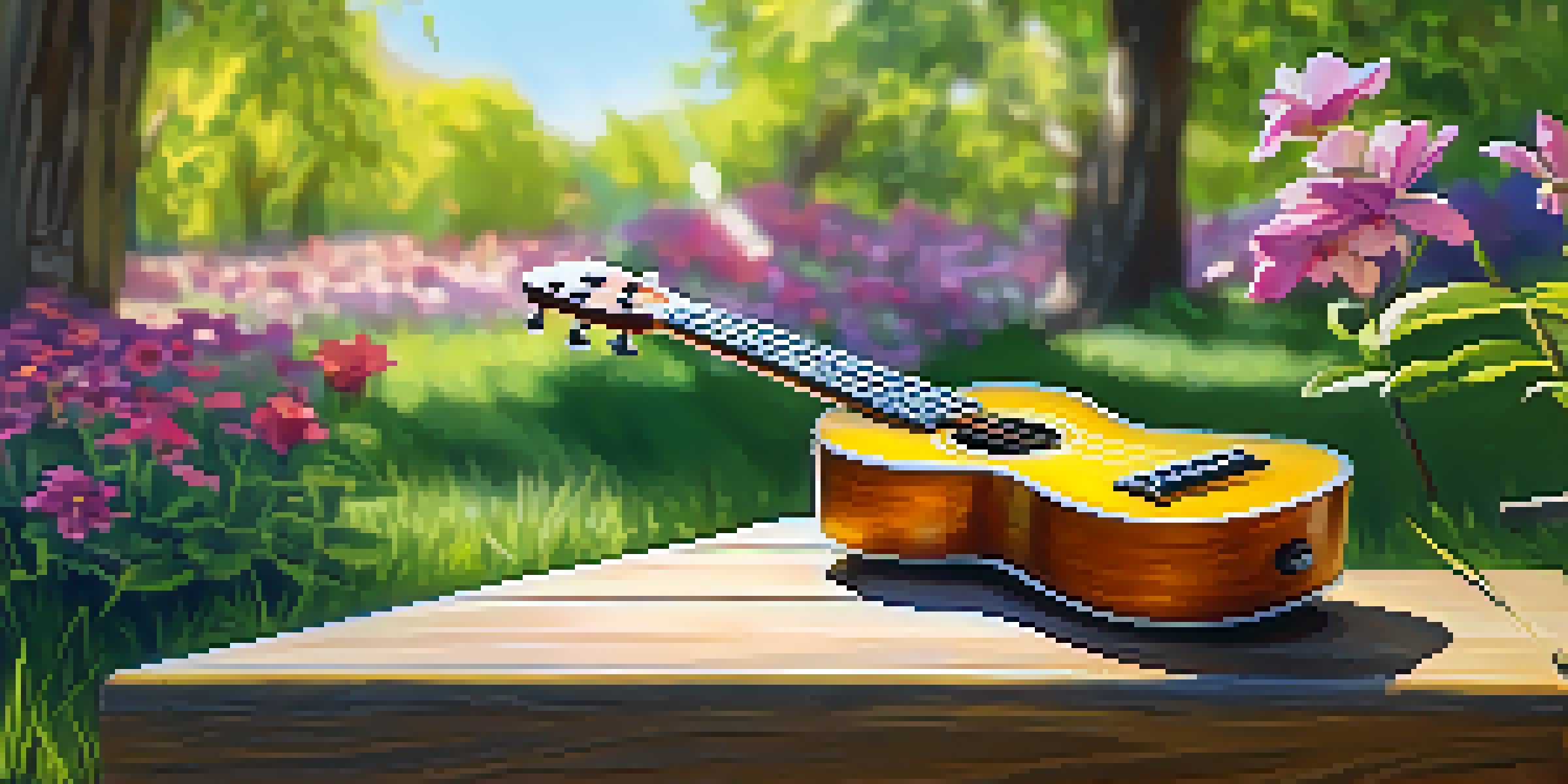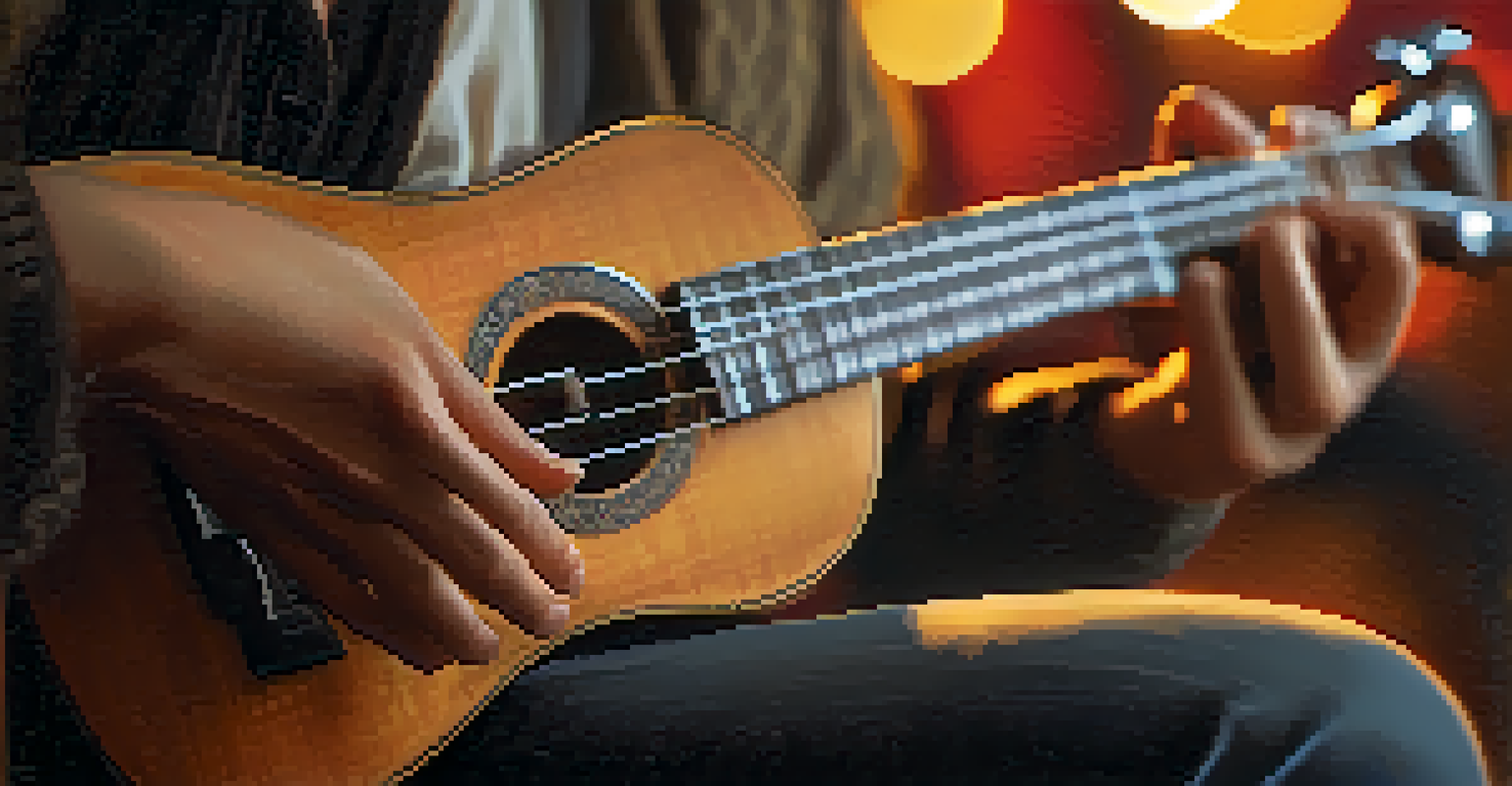Ukulele in Alternative Music: Uncovering Unique Soundscapes

The Ukulele: A Brief Overview of Its Unique Appeal
The ukulele, a small four-stringed instrument, originates from Hawaii and has a charming, cheerful sound that instantly captivates listeners. Its portability and ease of learning make it an appealing choice for musicians of all levels, which helps explain its growing popularity. Unlike its larger counterparts, the guitar and piano, the ukulele offers a distinct voice that can add warmth and whimsy to any genre, especially alternative music.
The ukulele is the instrument of choice for the wannabe rock star, the one-man band, and the beach bum alike.
In alternative music, artists often seek to break away from the mainstream sound, and the ukulele provides a perfect vehicle for this experimentation. The instrument's unique timbre can evoke a range of emotions, from joy to nostalgia, which aligns beautifully with the often introspective nature of alternative lyrics. As a result, the ukulele has become a staple for many indie artists looking to create something fresh and innovative.
This blending of styles is evident in the diverse range of music that incorporates the ukulele, from folk-infused melodies to pop and rock influences. By embracing this instrument, alternative musicians can craft soundscapes that are both distinct and memorable, allowing them to stand out in a crowded music scene.
Notable Alternative Artists Using the Ukulele
Several well-known alternative artists have incorporated the ukulele into their music, showcasing its versatility and appeal. For instance, the iconic band Vampire Weekend often features the instrument in their upbeat tracks, infusing their sound with a playful energy. Similarly, artists like Eddie Vedder have embraced the ukulele in solo projects, using its gentle tones to complement deeper, more reflective lyrics.

Another example is the whimsical music of Regina Spektor, whose ukulele-driven songs often blend various genres and styles. Her ability to weave intricate stories into catchy melodies makes her a standout in the alternative scene. The use of the ukulele adds a layer of lightness to her music while still allowing her to explore profound themes.
Ukulele's Unique Appeal in Music
The ukulele's cheerful sound and portability make it a favorite among musicians, particularly in alternative genres.
These artists illustrate that the ukulele can transcend traditional genre boundaries, allowing for creative expression that resonates with listeners. By integrating this instrument, they not only enhance their sound but also inspire a new wave of musicians to experiment with the ukulele in their own work.
The Ukulele's Influence on Alternative Music Genres
The ukulele has carved a niche within various subgenres of alternative music, from indie pop to folk-rock. Its bright, airy sound contrasts beautifully with the more somber themes often explored in these genres, creating a unique sonic balance. This juxtaposition allows artists to convey complex emotions while maintaining a sense of playfulness, making their music more accessible to a wider audience.
Music can change the world because it can change people.
In the indie pop realm, bands like The Lumineers have used the ukulele to complement their acoustic-driven sound, adding a layer of texture and brightness. This incorporation allows for catchy choruses that stick in your mind, while the emotional depth remains intact. The ukulele's simplicity can sometimes enhance the complexity of the lyrics, creating an inviting listening experience.
Moreover, the ukulele's presence in folk-rock signifies a return to roots, with its traditional sound evoking a sense of nostalgia. Artists like Jack Johnson utilize the ukulele to create laid-back, beachy vibes that transport listeners to serene locations, reinforcing the connection between sound and experience in alternative music.
Creating Unique Soundscapes with the Ukulele
One of the most exciting aspects of the ukulele in alternative music is its ability to create unique soundscapes. Musicians can experiment with different tunings, strumming patterns, and effects to produce a wide range of sounds. This versatility allows for an expansive creative palette, enabling artists to craft their own distinct sonic identities.
For instance, by using techniques such as fingerpicking or tapping, musicians can bring out the instrument's rich harmonics and textures. This experimentation can evoke various moods, transporting listeners through a journey of sound. The ukulele's inherent lightness can be juxtaposed with heavier instrumentation, offering a delightful contrast that keeps the listener engaged.
Diverse Artists Embrace the Ukulele
Notable alternative artists like Vampire Weekend and Regina Spektor showcase the ukulele's versatility in their innovative music.
Ultimately, the exploration of soundscapes using the ukulele reflects the spirit of alternative music itself—an embrace of individuality and creativity. As artists continue to push the boundaries of what is possible with this instrument, the potential for captivating soundscapes remains limitless.
Collaborations: The Ukulele Meets Other Instruments
Collaborations between ukulele players and other musicians can lead to innovative and unexpected sound combinations. For example, when paired with a heavy electric guitar, the ukulele can soften the overall sound, creating a unique blend that surprises listeners. This collaboration highlights the versatility of the ukulele, as it adapts to complement various musical styles and genres.
Moreover, the ukulele's pairing with traditional instruments, such as violins or cellos, can result in beautifully layered compositions. The gentle strumming of the ukulele can provide a melodic foundation, while the strings add depth and richness. This combination can be particularly effective in creating emotional moments within a song, drawing listeners in and encouraging them to connect with the music on a deeper level.
Ultimately, these collaborations showcase the ukulele's ability to enhance and elevate other instruments, creating a harmonious blend of sound. As artists continue to experiment with different partnerships, the possibilities for creative expression through the ukulele remain endless.
The Role of Ukulele in Live Performances
The ukulele plays a significant role in live performances, bringing an infectious energy that captivates audiences. Its lightness and portability make it an ideal choice for both solo musicians and bands, allowing for spontaneous moments and intimate settings. This connection between the performer and the audience is often enhanced by the ukulele's inviting sound, which encourages participation and engagement.
In live settings, artists often use the ukulele to create a relaxed atmosphere, inviting listeners to join in on sing-alongs or simply enjoy the performance. This communal experience fosters a sense of belonging and connection, making concerts memorable. The instrument's cheerful sound can uplift the mood, allowing for a shared moment of joy among attendees.
Future of Ukulele in Alternative Music
As the ukulele gains popularity, its role in alternative music is set to expand with exciting collaborations and creative experimentation.
Moreover, the visual appeal of the ukulele can enhance a live performance. Its colorful designs and compact size can draw the eye, making it an engaging focal point on stage. This combination of sound and sight helps to create a dynamic performance experience, further solidifying the ukulele's place in the world of alternative music.
The Future of the Ukulele in Alternative Music
As we look toward the future, the ukulele's presence in alternative music seems poised to grow even further. With its increasing popularity among emerging artists, we can expect to see innovative uses of the instrument that continue to push creative boundaries. This evolution reflects the broader trends in the music industry, where artists are increasingly blending genres and experimenting with different sounds.
The rise of online platforms has also made it easier for musicians to share their work and collaborate across genres, fostering a community of creativity. As a result, we may witness more cross-genre collaborations featuring the ukulele, allowing it to find its place in unexpected musical contexts. This adaptability is part of what makes the ukulele such a beloved instrument among musicians of all types.

Ultimately, the ukulele's future in alternative music is bright, with endless possibilities for exploration and innovation. As artists continue to embrace this instrument, we can anticipate exciting new soundscapes that resonate with listeners and inspire future generations of musicians.